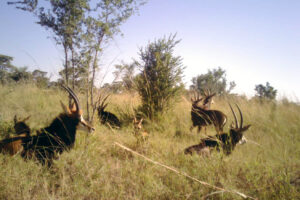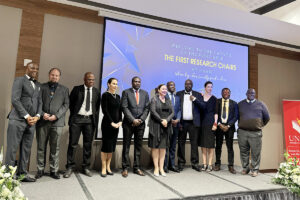Since it became a standalone school in 2016, the School of Public Health is graduating its first cohort with a Bachelor of Science in Public Health (Honours) degree this year.
All graduates from the first cohort, 22 females and 9 males, have joined the Ministry of Health & Social Services (MoHSS) on a 6-months contract, to assist the Ministry on the COVID-19 response. Among the graduates is one international student from Zimbabwe, who is assigned to the Zambezi region.
So far, in its four years of establishment, the School graduated over 50 professionals at postgraduate level. To be precise, 5 PhD holders in Public Health; 29 with a Master’s degree in Public Health (MPH), and 17 with a Master of Science (MSc) in Field Epidemiology and Laboratory Training (MPEL).
Josefina Haimbondi is among the first cohort of graduates on the undergraduate programme. “All my life I wanted to do something challenging and help improve people’s lives. At the beginning of 2016 academic year, I received some information by one lecturer at Main Campus about public health programme, showed me the prospectus and I liked the course description. I immediately wrote a letter to the faculty to change my course from Pre-engineering to Public Health,” narrated Josefina.
Namibia requires a highly skilled public health workforce, especially epidemiologists. Epidemiology is a branch of medical science that deals with the incidence, distribution and control of disease in a population. Once specialised, field epidemiology becomes the application or practice of epidemiology under conditions that include an unexpected public health problem that demands timely intervention, a time-constrained investigation that needs quick response, and the need for epidemiologists to work in the field to solve the problem, as well as to manage public health laboratory systems.
Prof Honoré Kabwebwe Mitonga, Associate Dean of the School, said: “The Field Epidemiologist graduates and other public health graduates from the School have actively participated in containing different outbreaks which occurred in Namibia in the last five years.
“In fact, they have worked on outbreaks investigation, preparedness and responses on the Congo Haemorrhagic fever in Omaheke Region, the Anthrax outbreak in Kavango Regions, as well as the Hepatitis-E outbreak in the City of Windhoek, Erongo and Omusati Regions. The group of Field Epidemiology students and graduates from the School are currently among the health care professionals who are fighting COVID-19 pandemic.
Among the first cohort of graduates, and currently serving 990km away from home as a MoHSS Disease Surveillance Officer in the Zambezi region, is Ooni Haggayi.
Ooni, who hails from Okatope village in Oshana Region, recounts how he ended up joining the 4-year degree qualification: “I was first enrolled for Biomedical Science in Windhoek. I was speaking to a friend over the phone, who told me that he is registered for a Public Health degree at Oshakati Campus. He explained a few things about the course, and just like that, I fell in love with public health! The next thing I applied for a transfer and hit the road to Oshakati. I never looked back since then.”





